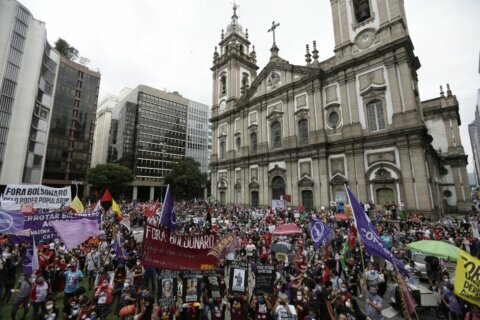RIO DE JANEIRO (AP) — Police on Sunday buried the 100th officer to be killed in Rio de Janeiro state this year, a 39-year-old who was shot multiple times while off duty and visiting his father.
The grim milestone underscores a surge in violence in Rio, Brazil’s signature city that just a year ago hosted the 2016 Summer Olympics. Authorities acknowledged in recent months that drug trafficking organizations and other criminal gangs now control large areas of the city. Thousands of soldiers have been deployed to help police, but even their presence has not slowed the bloodshed.
A sense of desperation could be felt among the 200 people who attended the funeral for Sgt. Fabio Cavalcante on Sunday afternoon. Cavalcante’s wife was so distraught that she could barely walk during the procession and had to be held up by the fallen officer’s brother, himself a part of the force.
Cavalcante, the father of an 8-year-old, was killed Saturday in Baixada Fluminense, one of Rio’s most violent districts. Several armed men approached, apparently intending to rob him. When they learned he was a police officer, he was shot at least 10 times, said his father, who Cavalcante was visiting.
“We were supposed to have a picnic today with the wives and widows of police officers,” said Rogeria Quaresma, the wife of an officer in attendance. “How long? How long is this going to keep happening before someone does something?”
Rio has long been the deadliest place for law enforcement in Brazil, which is Latin America’s largest nation. Going back to the 1990s, the number of officers slain in the state each year has almost always gone over 100.
What has security experts worried this year is the pace of police slayings. At the current rate, 2017 is on track to be the deadliest year since 2006, when 153 officers died, according to police data.
That spike is being mirrored in myriad crime data across the board, a surge fueled by rising unemployment in the wake of a major recession, an inability by the broke state government to pay thousands of public employees on time and a political crisis from a mega corruption scandal that has shifted the focus of many lawmakers away from Rio’s perennial security problems.
There is also growing consensus that Brazil’s criminal gangs, which are heavily armed and control many of Rio’s hundreds of slums, are strengthening. Earlier this year, gang-led slaughters in several Brazil prisons left at least 130 dead.
Many Rio residents, particularly in slums, loathe police, which have long been accused of corruption and excessive force. Every year, several hundred civilians are killed during police operations.
A Human Rights Watch report found that more than 8,000 people were killed by Rio police between 2005 and 2015, the majority young black men. While many were criminals shooting at police, many others were caught in the crossfire or even killed deliberately without provocation.
Adding to the problems is the erosion of a pacification program launched several years ago that aimed at building connections between officers and residents. Budget cuts have slashed program funds, and today neighborhoods previously lauded as “pacified” are increasingly dangerous.
Paulo Storani, the former captain of an elite squad of military police known by the Portuguese acronym BOPE, says that drugs have long powered the gangs because they provide ample resources while police forces are often working at a “deficit” of funds, training and arms.
What has him most worried of late, however, is the way officers are dying. While some are killed during confrontations, more are falling while off duty. That can happen because an officer sees a crime being committed and gets involved without the backup of his team, or because his position as officer makes him a target.
“Criminals are motivated to kill police,” said Storani.
All of Brazil was able to witness such brazenness in the killing of the 99th officer, Mabel Sampaio, on Thursday.
Street cameras in his neighborhood, obtained by local media and broadcast nationwide, captured the officer pulling into the garage of his home. Seconds later, a young man carrying a pistol can be seen walking in. Sampaio was shot several times and died en route to the hospital.
“I feared that this would happen, and that day has come,” his daughter Giulia wrote on her Facebook page. “They have destroyed our family. Unfortunately, this world is filled with monsters.”
___
Renata Brito on Twitter: www.twitter.com/RenataBrito91
Peter Prengaman on Twitter: www.twitter.com/peterprengaman
Copyright © 2026 The Associated Press. All rights reserved. This material may not be published, broadcast, written or redistributed.







